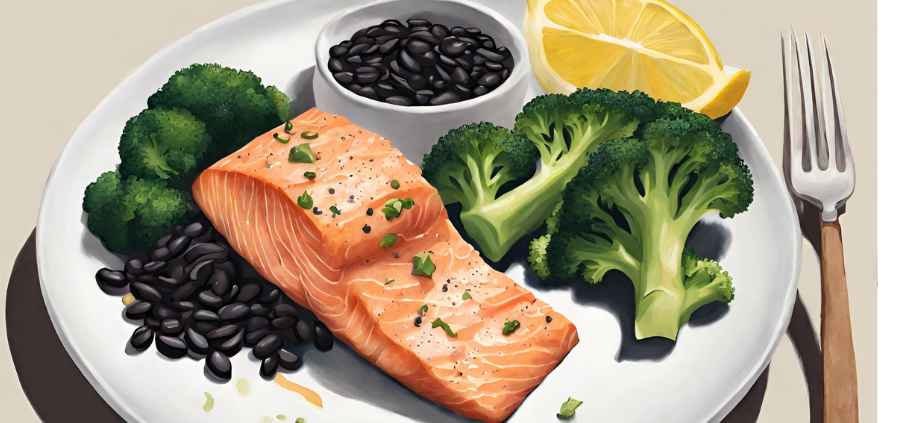Protein Needs for Adults 50+

This blog is part of our Nutrition newsletter. If you like this content, sign up to receive our monthly newsletter!
Key Takeaways:
- For adults aged 50+, we recommend consuming 1.2 – 1.6 grams of protein/kg of body weight per day (0.54 – 0.72 grams/pound body weight per day). For a 165-pound adult, this translates to roughly 90 – 120 grams of protein per day.
- To build muscle past the age of 50, we need to eat enough protein AND do weight training, and consume 30 – 35 grams of protein within two hours of the workout.
- Due to anabolic resistance, which increases as we age, it’s recommended to increase protein intake per meal to roughly 30 – 35 grams.
- Here is a detailed list of the protein content of various foods.
While looking at the menu at your favorite café and deciding whether to add salmon to your salad, it’s important to remember that we should strive to eat protein with every meal for optimal health. Protein is found in animal products, such as meat, fish, eggs, and dairy, as well as beans, tofu, nuts, and many vegetables. In your daily life, protein is the milk in your coffee, the eggs and cheese in your omelet, the chicken and beans in your burrito, and the handful of almonds as your afternoon snack.
Protein is essential for a multitude of functions in the body. Not only does protein support the building of our muscle mass, it helps the body repair tissues and cells, makes immunoglobulins and antibodies to fight infection, and drives metabolic reactions like digestion for energy production. It also makes up hormones, like insulin, provides structure in the body, such as bone and collagen, balances fluids and pH, as well as transports nutrients throughout the body, like blood sugar and cholesterol.
“It’s important to learn about protein and make sure we are eating enough because it’s a major building block of our bodies,” said Marily Oppezzo, PhD, MS, RDN, DipACLM, Nutrition Scientist and Head of the Stanford Lifestyle Medicine Nutrition Pillar. “We need to eat enough protein every single day to get the essential nutrients necessary for optimal health and functioning.”
How Much Protein Do You Need Every Day?
The federal guideline for individuals aged 19 and older is 0.8 grams of protein per kilogram of body weight. For a 165-pound adult, this translates to roughly 60 grams of protein per day (equivalent to consuming an 8oz salmon fillet and a handful of almonds). Many nutrition experts, however, believe this amount is too low, especially for those over 50.
“There is a growing body of evidence, particularly by researcher Stuart Phillips, that shows health benefits of consuming higher amounts of protein as we age, including slowing down age-related loss of muscle mass,” says Dr. Oppezzo. “There’s a difference between just surviving and thriving. For those over 50, I’d recommend between 1.2 grams / kg of body weight to 1.6 grams / kg of body weight, which is roughly double the federal recommendation.”
A recent study recommended that adults aged 18 to 30 consume 0.8 – 0.93 grams of protein per kilogram of body weight, with an increase of 0.85 to 0.96 grams / kg after the age of 30. For those over 65, another study recommended 1.2 – 2.0 grams / kg of body weight per day.
Dr. Oppezzo says that eating protein is not sufficient for building muscle—we must also strength train as we age. Researchers from this study recommend a protein intake higher than 1.6 grams / kg of body weight per day combined with resistance training to improve muscle strength. “Protein is important, but strength training is THE most important way to prevent age-related muscle loss, and it’s important to consume around 30 grams of protein within a couple of hours after working out,” she says. “First, give your body a reason to get stronger and build muscle (lifting weights), then give it enough materials (consuming protein) to build.”
Why Do We Need More Protein as We Age?
Starting around age 30, our body goes into maintenance mode, and our muscle mass starts to decline roughly one to two percent per year. And, as we age, the rate of decline increases by three to 10 percent per decade. Once we reach our 60s and beyond, the accumulated decline of muscle mass can increase the risk of falling, bone fractures, hospitalization, and earlier death, making the topic of protein consumption relevant to longevity.
“As we get older, we move less, and we eat less, and if we are not paying attention to our activity level and protein consumption, we can become frail,” says Dr. Oppezzo. “This becomes more important as we age because we become more anabolic resistant. Anabolic resistance is basically a reduced stimulation of muscle protein synthesis to a given dose of protein—it’s like you need to speak louder (more protein) for your muscles to hear (grow).”
Over the last ten years, there have been many studies on anabolic resistance. One study measured the amount of muscle synthesis between men aged ~22 and men aged ~71. The researchers gave each group a meal containing 20 grams of protein and then tested the degree of muscle synthesis. In the same sitting, both groups ate an additional 20 grams of protein, followed by a second test of muscle synthesis.
For the ~22 aged men, there was no difference in muscle synthesis between eating 20 or 40 grams of protein in one sitting. But for the ~71 aged men, their muscles were unresponsive to 20 grams of protein; they needed 40 grams. Specifically, the ~71-year-old group needed 0.4 grams / kg of body weight per meal, whereas the ~22 year-old-group only needed 0.2 grams / kg of body weight.
“The men in their 70s needed more than 20 grams of protein at a time to get their muscles to listen,” says Dr. Oppezzo. “Though they didn’t do this same elegant study in women, I imagine it is the same.”
Since protein consumption supports just about every function in the body, the body will utilize the amino acids where they are needed, such as the functioning of the brain, liver, immune system, or gastrointestinal tract. Unfortunately, maintaining muscle strength can be last on that list. Therefore, individuals over 50 need to consume enough protein to maintain the healthy functioning of their organs and keep their muscles strong.
“Within a meal, we must eat enough protein to wake up our muscles and say, ‘you have enough protein and calories to build,’ but in older adults, maybe the body is instead going to use that protein for energy or to support another function,” says Dr. Oppezzo. “I think muscle growth is a bit like remodeling your kitchen. You don’t remodel your kitchen if you can’t afford your utility bill. And, I think—as we age—the remodelers require more up-front cash.”
How Much Protein Do We Need Per Meal?
One study shows that there is no “upper limit” to the amount of protein we should eat in terms of our muscles’ ability to utilize it. However, Dr. Oppezzo suggests that we still spread out our protein throughout three meals a day.
Eating 20 grams of protein per meal might be enough if you’re 25 years old, but for those aged 50 or above, Dr. Oppezzo recommends 0.4 grams / kg of body weight per meal (which translates to 30 grams of protein per meal for a person who is 165 pounds).
Dr. Oppezzo says there are occasions when individuals may need to eat more towards the 1.6 grams / kg of body weight end of the range, such as competitive athletes or those recovering from an infection, hospitalization, or surgery. She also urges people who are intermittent fasting or on a very low-calorie or restrictive diet to make sure they are still consuming adequate protein.
“If we don’t eat enough protein during the day, where do we get our amino acids from? From our muscles!” exclaims Dr. Oppezzo. “I wouldn’t panic about a single day, but it’s not a great long-term plan.”
What are the Best Sources of Protein?
Luckily, every food has some protein in it! And most would agree that getting protein from a whole food source is always better than getting it from a powder. Whole foods have many other nutrients that are part of the package, and since we chew, swallow, and digest whole food at a specific rate, protein-rich foods enter the body more naturally than powders.
If you need to supplement with a protein powder, Dr. Oppezzo recommends whey protein or pea protein (vegan option). The most important amino acid needed to build muscle is leucine, which is found in high quantities in whey and milk. Researchers from this study found that leucine enhanced muscle protein synthesis in women aged 65 to 75, suggesting that older women should ensure that leucine is part of their protein intake.
“Although my mom, who is in her 70s, exercises every day, I’ve tried to supplement her activity by emphasizing eating enough protein every day and lifting weights weekly to keep her strong,” says Dr. Oppezzo. “I’m passionate about getting this information out there. It can help many people in their 50s and beyond maintain optimal health and live their best lives as they age.”




























